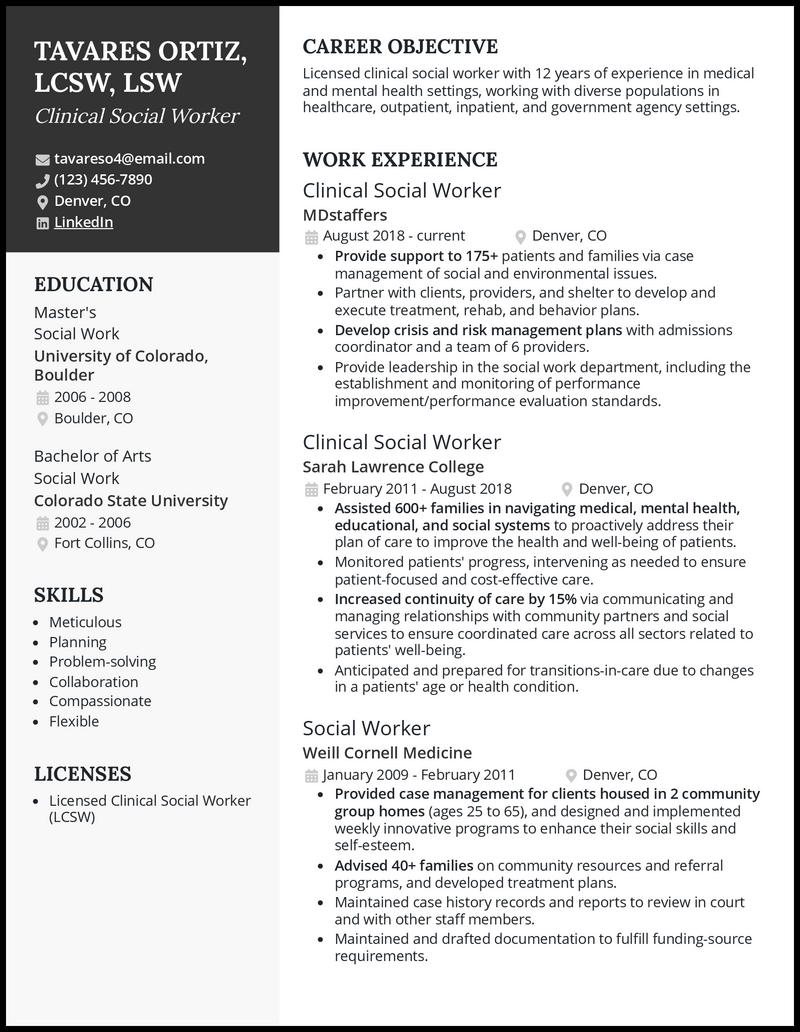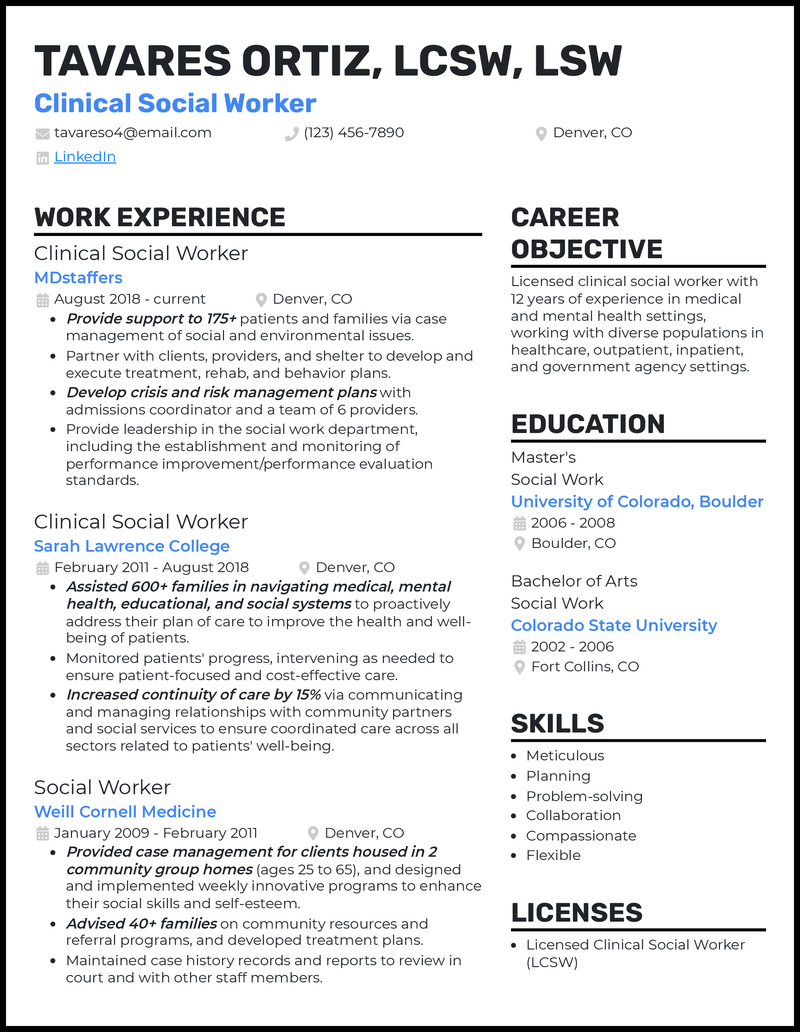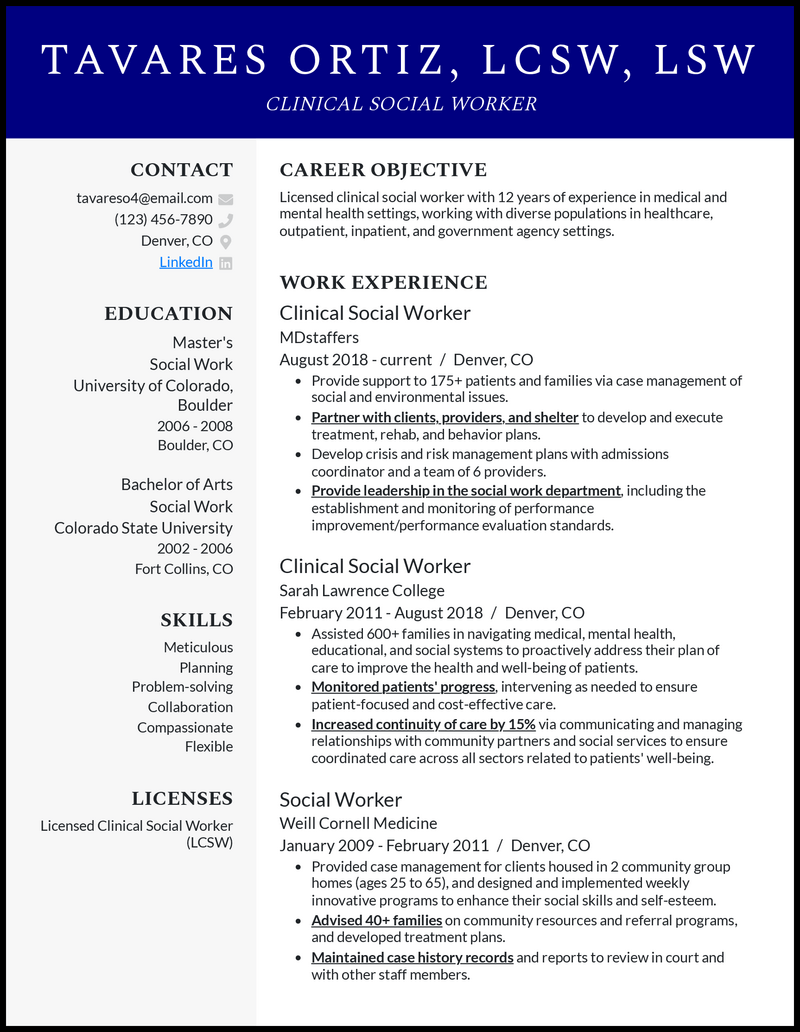You provide social support for people currently undergoing mental distress, coordinating with other social workers to offer therapeutic care for people who need assistance with emotional and behavioral disturbances. You might work in a variety of unique settings according to patients’ needs, including private practices and community mental health centers.
But what about writing a resume? You may still be wondering how long it should be and what’s most important to mention.
Don’t worry about it: We’ve helped plenty of social workers and health care providers with their resumes, and these three time-tested samples with tips for writing an effective cover letter can help you, too!
Why this resume works
- At a glance, your clinical social worker resume highlights outstanding achievements and has a stellar education section that puts the spotlight on your suitability for the open position. One problem, though—a large chunk of the candidate pool has the same qualifications. Have you tried setting yourself apart by showing off your certifications?
- Mentioning you’re a licensed clinical social worker on your resume is a smart trick to not only stand out from the crowd but also say you meet the required professional standards. That aside, it proves you’re compliant with industry regulations and paints you in a good light.
What Matters Most: Your Skills & Work History

When recruiters glance over your skills section, they want to get an immediate snapshot of which personal abilities make you a great clinical social worker: Did you use superior organizational skills to improve care continuity? Did you utilize your flexibility to adapt to changing patient needs?
Keep all your skills extremely relevant to your position whenever you can. Avoid generic abilities like “people skills” and start splitting hairs a bit! Think more along the lines of “active listening” and “compassion.”
Be as specific as you can! And, as odd as it sounds, be technical about your soft skills when you get into the details—think of what you use your interpersonal abilities for.
Here’s what we mean:
9 top Clinical Social Worker skills
- Calendar Planning
- Flexibility
- Compassion
- Active Listening
- MS Excel
- Problem-solving
- Critical Thinking
- First Aid
- Psychosocial Consulting
Sample Clinical Social Worker work experience bullet points
Now that your awesome skill set is there to hook recruiters’ attention, it’s time to lay out some powerful examples of how you’ve used your abilities to make a difference. Your skills are your tools, and recruiters want to see how you’ve built pathways to success through clinical social work.
You’ll want to provide examples of improvements you’ve made for both your practice or organization and for your patients as well. Every achievement and experience bullet point should apply directly to your cause.
And don’t forget to back things up with numbers. Provide metrics for your success in the form of quantifiable data. Toss in some improvement percentages and reduced numbers of manual work hours!
Here are some good examples:
- Increased continuity of care by 15% via communicating and managing relationships with community partners and social services to ensure coordinated patient care across all sectors
- Monitored patients’ progress, intervening as needed to ensure patient-focused and cost-effective care, reducing cost of care by 7%
- Developed crisis and risk management plans with admissions coordinator and care provider teams to improve efficiency by 11% and eliminate 9 monthly labor hours
- Provided leadership in the clinical social work department, establishing and monitoring performance evaluations and improvement plans with MS Excel, ultimately boosting productivity by 18%
Top 5 Tips for Your Clinical Social Worker resume
- Balance your skills
- It can be tricky to get technical about such a compassion- and people-focused job role, but working in some hard skills or software programs can make you seem more well-rounded. Think of the digital tools you used for patient care schedules or documentation, and then work them into your experience section.
- Use an organized template
- Show how good you are at staying on top of things by polishing up your resume template to look tidy and readable. You want to look as professional as possible!
- Minimize visual distractions
- Speaking of looking professional, make sure you avoid any colors that draw attention away from your resume’s subject matter. Use just one color in small doses to set off key headers or contact info, and avoid any strange fonts. Your resume should be clear, simple, and readable—just like your patient care plans.
- Pull in references
- If you’re just starting out in your clinical social work specialization, then you might want to call for some backup! A couple of professional letters of recommendation can go a long way in boosting your credibility, especially if you’re a bit short on relevant experience.
- Objective statements should pop
- Plenty of people agonize over whether or not they should include an objective statement in their resumes. You should only include one if it adds fresh information—always avoid redundancy when you can.
Yes! No matter how experienced you are or how much you’ve achieved within your field, your licensure is key to your qualifications as a clinical social worker. Recruiters want a quick statement of any certifications you have that relate to the job.
Just stick with one page, or even less if you can manage it! (Sometimes it’s tough to pare down your experience section and make everything fit on your resume, but if you save your favorite experience points you can recycle them for a cover letter.)
Flexibility is key for a clinical social worker! And you can show that you have what it takes by featuring a variety of achievements in your job history, including some that mention changing circumstances. That way you’ll show that you can think on your feet and adapt to a variety of tasks.








